Related Research Articles
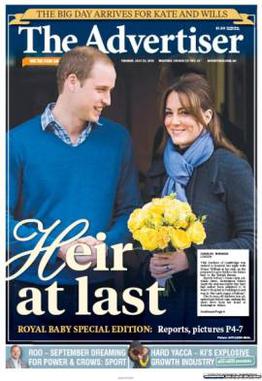
The Advertiser is a daily tabloid format newspaper based in the city of Adelaide, South Australia. First published as a broadsheet named The South Australian Advertiser on 12 July 1858, it is currently a tabloid printed from Monday to Saturday. The Advertiser came under the ownership of Keith Murdoch in the 1950s, and the full ownership of Rupert Murdoch in 1987. It is a publication of Advertiser Newspapers Pty Ltd (ADV), a subsidiary of News Corp Australia, itself a subsidiary of News Corp. Through much of the 20th century, The Advertiser was Adelaide's morning broadsheet, The News the afternoon tabloid, with The Sunday Mail covering weekend sport, and Messenger Newspapers community news. The head office was relocated from a former premises in King William Street, to a new News Corp office complex, known as Keith Murdoch House at 31 Waymouth Street.

Boyle Travers Finniss was the first premier of South Australia, serving from 24 October 1856 to 20 August 1857.
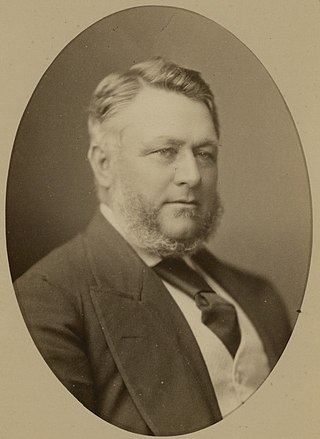
Sir Henry Ayers was the eighth Premier of South Australia, serving a record five times between 1863 and 1873.

Thomas Reynolds was the fifth Premier of South Australia, serving from 9 May 1860 to 8 October 1861.
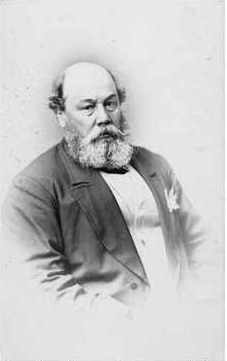
Sir Arthur Blyth was Premier of South Australia three times; 1864–65, 1871–72 and 1873–75.
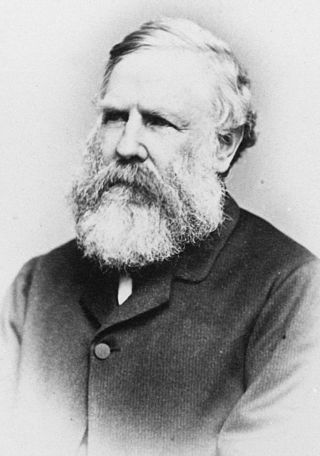
Captain John Hart CMG was a South Australian politician and a Premier of South Australia.
South Australian Jockey Club is the principal race club in South Australia.
John Henry Barrow was a Congregational minister, journalist and South Australian politician.

Randolph Isham Stow was an English-born Australian Supreme Court of South Australia judge.
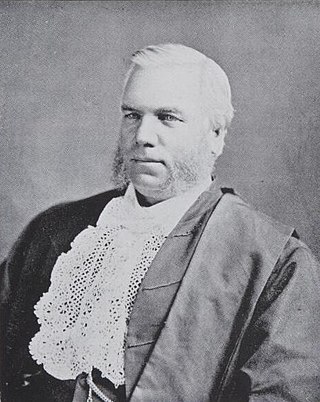
Sir William Milne was an Australian entrepreneur and politician, serving as the member for Onkaparinga in the South Australian House of Assembly from 1857 to 1868. He was elected to the South Australian Legislative Council in 1869, and was President of the South Australian Legislative Council from 25 July 1873 to 1881.

Sir John Newlands, also known as John Newland, was a Scottish-born Australian politician.

The Adelaide Football Club, often referred to as the Old Adelaide Football Club, was an Australian rules football club based in Adelaide. Founded on 26 April 1860, it was the first football club formed in South Australia.
This is a list of members of the South Australian Legislative Council from 1881 to 1885.
The Second Reynolds Ministry was the 6th Ministry of the Government of South Australia, led by Thomas Reynolds. It commenced on 20 May 1861, when Reynolds succeeded in reconstituting his ministry and retaining power after the defeat of the First Reynolds Ministry. The ministry resigned in October 1861 when Reynolds was unable to reconstruct a ministry following the resignation of John Morphett as Chief Secretary. It was succeeded by the First Waterhouse Ministry, which was specifically constructed as a short-term ministry to deal with the matter of dissident Judge Benjamin Boothby, on 8 October.
The First Dutton Ministry was the 9th Ministry of the Government of South Australia, led by Francis Dutton. It commenced on 4 July 1863, when Dutton, who had moved the motion to oust his predecessor, was sworn in to lead what was reported to be an interim ministry to deal with the Tariff Bill. However, the ministry was defeated on a series of adjournment votes on its first sitting day in parliament, and announced their resignation for lack of the parliament's confidence. Randolph Isham Stow was sent for but failed to win support to succeed Dutton, and with former Premier George Waterhouse and Arthur Blyth both lacking support, Henry Ayers was finally sent for and sworn in heading the First Ayers Ministry on 15 July.
The First Ayers Ministry was the 10th Ministry of the Government of South Australia, led by Henry Ayers. It commenced on 15 July 1863, when Ayers won support to form a ministry after the collapse of the First Dutton Ministry. In July 1864, the ministry was defeated on a motion of no confidence, but his opponents were unable to form government, and Ayers was sworn in heading the reconstituted Second Ayers Ministry on 22 July 1864.
The First Blyth Ministry was the 12th Ministry of the Government of South Australia, led by Arthur Blyth. It commenced on 4 August 1864, when Blyth succeeded in forming a ministry following the resignation of the Second Ayers Ministry. It was succeeded by the Second Dutton Ministry on 22 March 1865, when Francis Dutton won the support of the new parliament that had been elected at the 1865 election.
Whitmore Blake Carr, was a journalist, sportsman in South Australia and longtime chairman of the Adelaide Stock Exchange. He has been referred to as "Doc" Carr.
The Telegraph was a newspaper in Adelaide, South Australia, founded in 1862, and merged with The Express to become The Express and Telegraph, published from 1867 to 1922.
A number of survey parties to the Northern Territory were involved in attempts to found a settlement in the Northern Territory during the years 1864–1870. This article describes attempts by the South Australian Government to found a settlement in the Northern Territory, and the people who took part in those ventures. It includes lists of all known participants.
References
- ↑ "Statistical Record of the Legislature, 1836-2009" (PDF). Parliament of South Australia. Retrieved 8 October 2015.
- ↑ "RESIGNATION OF THE MINISTRY". South Australian Register . Adelaide. 1 August 1864. p. 2. Retrieved 9 October 2015– via National Library of Australia.
- ↑ "SOUTH AUSTRALIA". Geelong Advertiser . Vic. 5 August 1864. p. 2. Retrieved 9 October 2015– via National Library of Australia.
- ↑ "The Advertiser. ADELAIDE: FRIDAY, AUGUST 5, 1864". The South Australian Advertiser . Adelaide. 5 August 1864. p. 2. Retrieved 9 October 2015– via National Library of Australia.